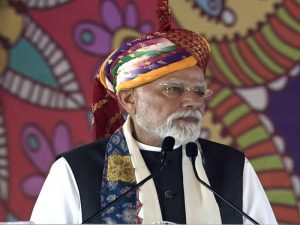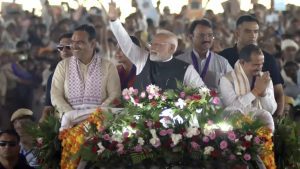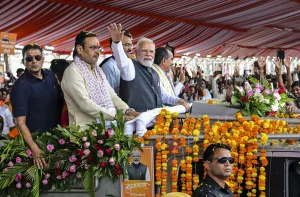Rajasthan – Prime Minister Narendra Modi inaugurated and laid foundation stones for Rajasthan development projects worth over Rs 1,22,100 crore in Banswara, marking one of the largest single-day development initiatives in the state’s history. The comprehensive package spans energy generation, water infrastructure, transportation, and employment, demonstrating the government’s commitment to accelerating regional growth.
During his Banswara visit on the fourth day of Navratri, PM Modi paid homage to Maa Tripura Sundari and Maa Mahi while honoring the legacy of Mahayogi Govind Guru Ji, Maharana Pratap, and Raja Bansia Bhil. The Prime Minister emphasized that these Rajasthan development projects represent a new chapter in India’s progress, particularly in the energy sector.
Nuclear and Clean Energy Revolution

The centerpiece of these Rajasthan development projects is the Mahi Banswara Rajasthan Atomic Power Project worth approximately Rs 42,000 crore. This facility, featuring four indigenous 700 MW Pressurized Heavy Water Reactors, will become one of India’s largest nuclear plants, providing reliable base load energy while strengthening environmental stewardship.
PM Modi announced power projects exceeding Rs 90,000 crore across Rajasthan, Madhya Pradesh, Andhra Pradesh, Karnataka, and Maharashtra. These Rajasthan development projects include solar energy installations at Phalodi, Jaisalmer, Jalore, Sikar, and Bikaner, along with a Solar Park at Ramagiri in Andhra Pradesh, contributing significantly to India’s clean energy capacity.
The Prime Minister highlighted that the government is transforming clean energy into a people’s movement through schemes like PM Surya Ghar Muft Bijli Yojana for rooftop solar installations and PM-KUSUM for agricultural solar pumps, directly benefiting lakhs of farmers.
Power Transmission and Grid Infrastructure


Among the significant Rajasthan development projects are three power transmission initiatives worth over Rs 13,180 crore under the Renewable Energy Zone initiative. These include 765 KV transmission lines connecting Beawar to Mandsaur, Sirohi to Mandsaur and Khandwa, and Bikaner to Siwani, Fatehabad, and Patran, facilitating seamless transfer of 15.5 GW green energy.
PM Modi also inaugurated feeder level solarization projects of 3,517 MW worth over Rs 16,050 crore across Rajasthan, Maharashtra, Madhya Pradesh, and Karnataka under the PM-KUSUM scheme, ensuring affordable irrigation power for farmers while promoting rural energy self-reliance.
Water Security and Infrastructure Development
Water resources constitute a major component of these Rajasthan development projects, with initiatives worth over Rs 20,830 crore launched. These include construction of various feeders from Isarda, the Mor Sagar artificial reservoir in Ajmer, intake pump house at Bisalpur Dam, and rejuvenation of Khari feeder, alongside inauguration of Isarda Dam, Dholpur Lift Project, and Takli Project.
Additionally, drinking water supply projects worth over Rs 5,880 crore were initiated in Banswara, Dungarpur, Udaipur, Sawai Madhopur, Churu, Ajmer, and Bhilwara districts under AMRUT 2.0, ensuring safe and clean drinking water access for all citizens.
Transportation and Connectivity Enhancement
Railway connectivity received significant attention among Rajasthan development projects, with PM Modi flagging off three trains including Vande Bharat Express services between Bikaner-Delhi Cantt and Jodhpur-Delhi Cantt, plus Udaipur City-Chandigarh Express, significantly improving connectivity between Rajasthan and northern states.
Also Read: Agni-Prime Rail Launch: Historic Breakthrough Transforms India’s Defense Strategy
Road infrastructure projects worth over Rs 2,630 crore include construction of flyovers at Bharatpur city, a bridge over Banas River, 116 Atal Pragati Path projects, and multiple National and State Highway improvements in Barmer, Ajmer, and Dungarpur districts, ensuring smoother traffic flow and enhanced road safety.
Employment Generation and Tribal Welfare
The Rajasthan development projects package includes distribution of over 15,000 appointment letters to newly appointed youth in government departments, comprising animal attendants, junior assistants, junior instructors, junior engineers, and teachers, demonstrating commitment to employment generation.
PM Modi emphasized that tribal welfare remains central to government priorities, noting the establishment of a dedicated tribal affairs ministry and initiatives like PM Janman Yojana and Dharti Aaba Janjatiya Gram Utkarsh Abhiyan benefiting over five crore tribal citizens. The Van Dhan Yojana and increased MSP for forest produce further support tribal economic advancement.
GST Reforms and Economic Relief


The Prime Minister highlighted recent GST reforms implemented on September 22, describing them as a “GST Savings Festival” that has made everyday items more affordable. He provided specific examples: household essentials that cost Rs 131 before 2014 now cost Rs 105, footwear prices have decreased by Rs 50, motorcycles are Rs 9,000 cheaper, and cement bags cost Rs 40 less in taxes.
PM Modi emphasized the importance of swadeshi products during the festive season, noting that purchasing domestic goods keeps money within the country, benefiting local artisans, workers, and traders while contributing to national development.
Political Context and Governance Critique
The Prime Minister criticized previous administrations for neglecting electricity infrastructure, noting that 2.5 crore households lacked connections and 18,000 villages had no electric poles even after 70 years of independence. He alleged that opposition rule in Rajasthan led to misgovernance, paper leaks, corruption in Jal Jeevan Mission, and increased crime, contrasting this with current development acceleration.
These comprehensive Rajasthan development projects spanning energy, water, transportation, and employment demonstrate the government’s holistic approach to regional development, positioning the state on a fast track toward progress and prosperity.

